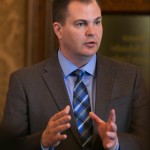OLYMPIA…The state Senate today doubled down on its support for the special-education policy improvements in Sen. John Braun’s Senate Bill 5532, with a vote that would have the effect of keeping the bill alive through the end of the Legislature’s regular session Sunday.
“The Democrat leadership in the House has basically claimed it hasn’t had time to consider this bill. The unanimous vote by the Senate today gives the House two more days to find the two minutes needed to conduct a vote – because that’s literally all the time it would take to light up the voting board and let House members push the ‘yes’ button,” said Braun, R-Centralia, who is the Senate Republican budget leader.
“The Senate isn’t giving up on seeing this good legislation move to the governor’s desk,” Braun added.
SB 5532 is the Senate’s way to give parents more help in navigating the system and advocating for the specific needs of their children, give students more help with the transition to further education and training after high school, and get teachers the professional development they can use to promote inclusion. The content of the bill lines up with what parents of special-ed students were hoping to see from the Legislature this year. It and Senate Bill 5091 both received unanimous support March 9 from the Senate.
“SB 5091 is positioned for a full House vote, but SB 5532 was set aside and had become ineligible for a House vote,” Braun explained. “The Senate’s vote today makes SB 5532 exempt from any more voting deadlines, so it’s eligible to be included in any session-ending budget package. That’s exactly the outcome we want to see.”









